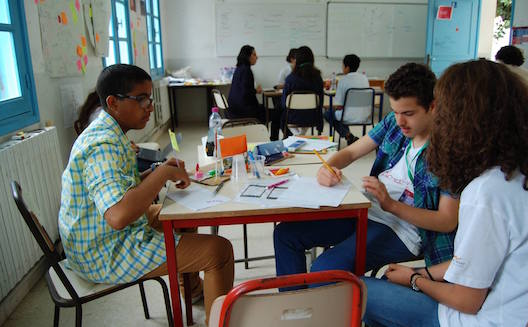Tunisian teens start thinking like entrepreneurs


Students
putting themselves in an entrepreneur’s shoes. (Images
via Spark)
The time is long gone when starting a business as a teenager meant loneliness, being misunderstood by one’s peers, and scaring your parents. In Tunis, at least, a change in mindset is underway.
High-schoolers Sara Ghodbane, 15, and Leila Mnekebi say only a few of their classmates were interested in entrepreneurship - it’s a matter of tastes after all - but they’ve noticed a true interest for the topic in their schools.
Rym Baouendi, cofounder of coworking space Cogite and program advisor of the entrepreneurial activities of the Biat Foundation, has also noted a change in mentality.
“Parents are aware that entrepreneurship, innovation, it’s important too, and that’s something school doesn’t necessarily offer,” she said.
Parents she meets in her everyday life, be they executives or hairdressers, often ask her what coding or innovation programs exist in Tunis. “There’s a thirst to register their kids,” she said.
Parental push
Events such as the Biat Foundation-run Spark hackathon in early June, which attracted 150 teenagers, mobile app development challenge Technovation Tunisia and coding school The Young Coders Academy that both nurture children’s curiosity and are a result of the surge in interest.
“I saw the [Spark] event on Facebook, I didn’t not hesitate for a second, I registered straight away,” Fatima Elloumi said, who joined the event even if it was only a week away from her baccalaureate exam. “I didn’t even ask my parents,” she confessed.
For her, as for many others participants, this event was an occasion to know more about a sector she was interested in. For her, it was marketing, as she doesn’t really know what career she’d like to do later. “I wanted to know if I was made for this and if I had the skills required.”
Ellouze Khalil, 16, joined the Spark hackathon after his mom suggested it, and a carpenter from Kairouan, two hours south of Tunis, made the trip both days so that his 12 and 13-years-old daughters could join in.
Ghodbane and Mnekebi, who’d actually met at a hackathon, said they join these types of events to experience creativity rushes, find solutions to problems, and broaden their mind.
“I met a lot of people and it’s really very interesting,” Ghodbane said.

Fatima
Elloumi (second from the right) and her team presenting their
project.
May teenagers become entrepreneurs
Baouendi said it don’t necessarily mean they want all teens to become entrepreneurs, but are trying to developing an entrepreneurial culture amongst teenagers and develop a ‘doer’ way of thinking.
“Having employees with an entrepreneurial attitude, that would take initiatives, would do intrapreneurship, it’s excellent for Tunisia and companies,” she explained.
Local success stories are one way to expose youth to success stories, such as the Biat Foundation’s online videos where entrepreneurs explain how they came to be entrepreneurs.
Hacking out a new culture
The Spark hackathon is a strong example of how positively Tunisia’s young people, and their parents, are beginning to react to the trappings of entrepreneurship.
Teams of 15-18 year olds of mixed ages, sexes and backgrounds had a day and a half to find and solve a problem.
They defined, ideated, brainstormed and prototyped until they had a solution that was pitchable to a judging panel - the equivalent of adult hackathon competitions such as the regional Startup Weekend events or the Expo Innovation Challenge in Dubai last year.
“What I liked was the way of thinking, all the idea generation methods that we were given,” said Khalil. “What was really great was that they made us [do] a real oral presentation. We really got to test or speaker skills.”
Ghodbane said that the main takeaway was learning about herself: “I just realize that I have a bit of a leader mind, I know how to manage people.
The first of many
This is one of the first events the Biat Foundation, created by Tunisian bank Biat, organized as part of their new entrepreneurship activities.
Those activities will be spread across three pillars. On top of developing the entrepreneurial culture amongst kids and teenagers, it also joined the launch of FLat6Labs accelerator and Le15 startup hub as a partner, and said it would launching the Endeavor network in Tunisia.
A third pillar will be to offer a better analysis of the ecosystem. They’re currently working on an interactive map of the scene, that should support a healthy ecosystem those teenagers will be able to grow into.


